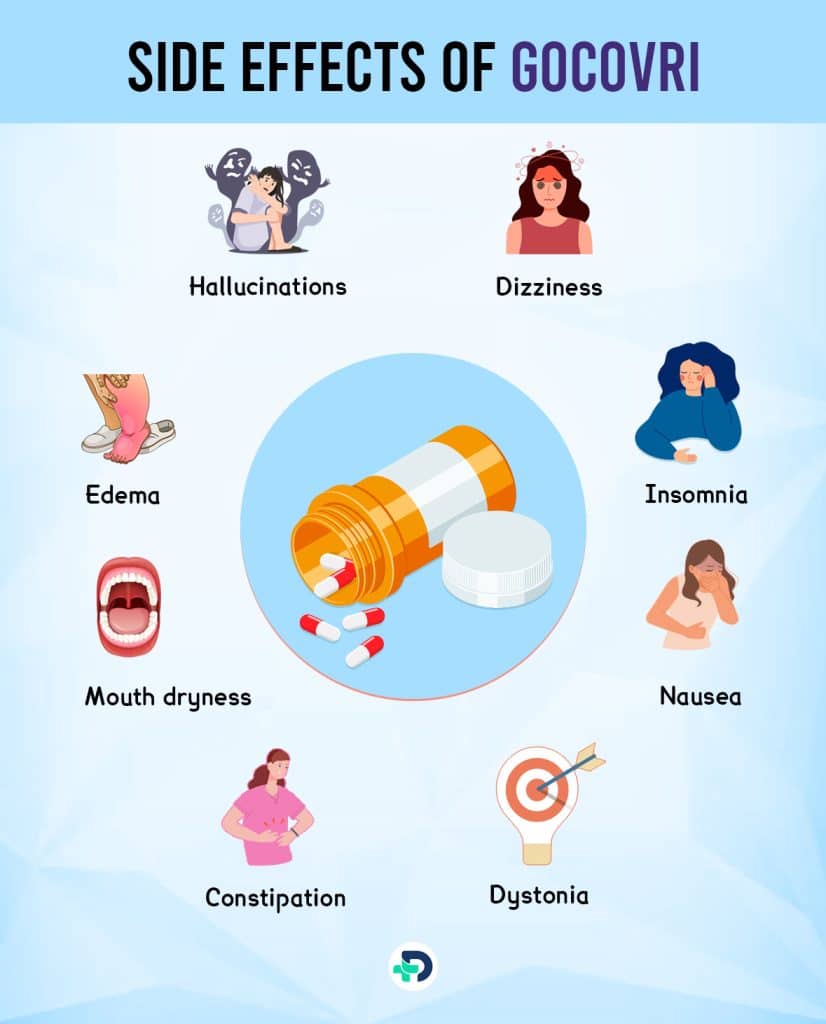Gocovri : Uses, Dosage, Side effects and Interactions

- Gocovri
- 22 Aug 2023
Overview
About Gocovri
The U.S. Food and Drug Administration (FDA) authorized gocovri in 2017 as the first medication suggested particularly for levodopa-induced dyskinesia.
Gocovri 1Overview| Researched based study from Empr.com is given the generic name, Amantadine. It belongs to the Dopaminergic antiparkinsonism class of drugs. Amantadine is promoted for the treatment of dyskinesia in patients with Parkinson.
Amantadine hydrochloride has both antiviral and antiparkinsonian properties.
Gocovri is an extended-release capsule that enables Parkinson’s patients to live a better life by reducing stiffness, involuntary movements and tremors.

How does it work?
The mechanism of action for Gocovri is broken down as follows:
- Gocovri helps in the control of glutamate release and transmission, which is thought to be dysregulated in Parkinson’s disease.
- Gocovri increases dopamine release and makes up for the dopamine depletion that occurs in Parkinson’s disease.
- Gocovri helps to increase the amount of dopamine that is available in the brain.
Uses
Uses of Gocovri
In two clinical studies, Gocovri was tested on people with dyskinesia due to Parkinson’s disease (PD). These studies evaluated Gocovri’s capacity to:
- Reduce dyskinesia.
- Shorten the “off time”
- Extend the “on time”2Uses| Researched based study from Fda.gov
Reduce dyskinesia
- It is the primary goal of Gocovri. Dyskinesia is defined as the state of abnormal and involuntary movements that might arise as a result of prolonged levodopa treatment. Gocovri is indicated for treating levodopa-induced dyskinesia in patients diagnosed with Parkinson’s disease.
Shorten the “off time”
- The term “Off time” describes times when the medication’s efficacy fades and symptoms of Parkinson’s disease, such as stiffness, slowness of movement and tremors, return before the next dosage is scheduled.
Extend the “on time”
- For people with Parkinson’s disease, gocovri has been researched for its potential to lengthen the “on time” (when the drug is successfully controlling symptoms) thus increasing motor function and overall quality of life.
Side effects

Side effects of Gocovri
Gocovri side effects might range in frequency and severity, and not everyone who takes it will experience them.
The following is a list of possible Gocovri side effects:
- Hallucinations
- Dizziness and lightheadedness
- Edema
- Dry mouth
- Insomnia
- Constipation
- Insomnia
- Livedo reticularis
- Abnormal dreams
- Urinary tract infection
- Nausea and vomiting
- Blurred vision
- Benign prostatic hyperplasia
- Joint swelling
- Dystonia
- Suicidal thoughts/depression
- Unusual urges
Hallucinations
- Hallucinations, in which one perceives, hears, or feels things that are not really there, may become more likely while using gocovri. This is more likely seen in elderly people.3Side effects| Researched based study from Fda.gov
Lightheadedness and dizziness
- Gocovri may make you feel woozy and lightheaded, which might make you more likely to trip and fall, especially when getting up rapidly or shifting positions.
Edema
- When using Gocovri, some people may develop edema, or swelling or fluid retention on the legs, ankles, or feet.
Mouth dryness
- Gocovri might make your mouth feel dry, which can be uncomfortable or make you thirstier.
Constipation
- Constipation brought on by gocovri may make it challenging to pass feces.
Insomnia
- While using Gocovri, some people may develop insomnia or trouble falling asleep.
Livedo reticularis
- Livedo reticularis is a mottled discoloration of the skin that generally affects the legs or arms.
Strange dreams
- Gocovri may result in strong, unusual, or vivid nightmares.
Symptoms of a urinary tract infection
- It can be in the form of burning or discomfort while urinating, blood in the urine, nausea, and fever.
Nausea and vomiting
- Some people may experience nausea and vomiting after taking gocovri.
Benign prostatic hyperplasia (BPH)
- The pathological enlargement of the prostate presents as difficulty urinating or burning urination.
Swelling of a joint
- It can be joint discomfort, stiff joints or warmth or redness around a joint.
Dystonia
- It can be Eyelid twitching, muscular pain, difficulty speaking and flexion of muscles.
Suicidal thoughts/depression
- Some Gocovri users have desires to act in a manner that is unexpected for them. An uncommon impulse to gamble, heightened sexual inclinations, strong financial cravings, binge eating, and an inability to manage these urges are a few examples of this.3Side effects| Researched based study from Medlineplus.gov
Unusual urges
- History of depression or suicidal attempts or thoughts is a common feature seen with patients who use Gocovri. Inform your doctor if you have any fresh or unexpected changes in your emotions, behaviors, thoughts, or mood, including ideas that you could harm yourself or take your own life.
Dosage
Gocovri dosage
Gocovri is sold in the form of oral extended-release capsules. There are two strengths available: 137 mg and 68.5 mg. Your doctor’s recommendation 2Dosage| Researched based study from Fda.gov for Godavari dose will depend on any existing medical issues and the way your body responds.
- Gocovri is an extended-release capsule that has to be taken once a day, entirely.
- It shouldn’t be split, eaten, or crushed. Gocovri capsules, however, may be opened and their contents dusted out into a tiny quantity of soft food, such applesauce or pudding, for persons who have trouble swallowing.
- The resultant mixture has to be promptly eaten whole. It shouldn’t be kept for a future purpose.
Parkinson’s disease patients’ dyskinesia dosage
- Adults with Parkinson’s disease (PD) may use gocovri to treat dyskinesia (uncontrolled, uncontrollable movements). Gocovri’s beginning dose is typically 137 mg administered once day before night.
What to do in case of a missed dose?
- It is recommended to just skip the missed dosage of Gocovri and take your subsequent dose as scheduled. By taking more medicine than normal at your subsequent dosage, don’t attempt to make up for the missed one.
What to do in case of overdose?
Gocovri has major negative effects if used in excess of the dose advised. Use Godavari just as much as your doctor instructs.
Overdose symptoms might include:
- Agitation
- Aggressiveness
- Seizures
- Psychosis
- Coma
How long does it take for Gocovri to work?
- The effects of Gocovri might be felt immediately after dosing. However, it might take a few days to a few weeks of therapy before your symptoms start to improve. The time it takes for Gocovri to start working varies from person to person.
Storage
Storage
- Gocovri capsules need to be kept at room temperature, which is between 20°C and 25°C (68°F to 77°F).
- The capsules may be stored at temperatures between 59°F and 86°F (15°C and 30°C) for brief periods of time.2Storage| Researched based study from Fda.gov
- Gocovri has to be maintained in a container that is completely sealed. Avoid keeping this medicine in restrooms or other locations where it could become wet or moist.
Precautions
Precautions and warnings
Discuss your medical history with your doctor before using Gocovri. If you have certain medical disorders or other variables influencing your health, Gocovri may not be the best choice for you. These consist of:
Kidney issues
- In the event that you have serious renal issues, it is advised against using Gocovri.
Sleep issues
- Gocovri has the ability to make people drowsy to the point of falling asleep during activities. People with inadequate sleep or bad sleep cycle may experience these side effects more severely.
Using alcohol
- Alcohol use might make certain Gocovri adverse effects worse.
Irrational impulses
- People using Gocovri have reported experiencing strange desires including binge eating, obsessive gambling, and impulsive buying. Taking Gocovri can make your uncontrolled urges worse if you have a history of them. Inform your doctor about any prior instances of uncontrolled cravings before beginning Gocovri.
Suicidal thoughts and depression
- If you have a history of depression, sadness, suicidal thoughts, taking Gocovri might put you at a higher risk of experiencing these adverse effects. Before using Gocovri, discuss with your doctor about any previous experiences with depression or suicidal thoughts or actions.
Psychotic illness
- People suffering from Hallucinations, psychosis or a severe psychotic disease like schizophrenia are more at risk. They are advised against using this medication due to the risk involved.
An allergic response
- You must not use Gocovri if you’ve ever had an adverse response to any of its components or the drug itself. Consult your doctor about any other drugs that could be more suitable for you.
Pregnancy
The safety of using Gocovri while pregnant is unknown. However, during animal investigations, harm to developing fetuses exposed to amantadine was observed. Some instances of these detrimental impacts include:
- The birth weight was lower.
- Malformed skeletons.
Breastfeeding
- It is unknown whether breastfeeding is safe when taking Gocovri. Gocovri’s active ingredient, amantadine, is excreted in human breast milk. However, it is unknown if the medicine affects infants or how much of the drug enters the milk.2Precautions| Researched based study from Fda.gov
Drug Interactions
Gocovri drug interactions
The list of drugs that may interact with gocovri is provided below. Not all the medications that could interact with Gocovri are included in these lists.2Interactions| Researched based study from Fda.gov
Gocovri and anticholinergic medications:
Gocovri may have adverse effects like those of anticholinergic medications.
Anticholinergics may have a variety of negative consequences, for instance:
- Diarrhea
- Constipation
- Watery eyes
- Urinary retention
Anticholinergic medications with potent adverse effects, some of which may be exacerbated by Gocovri, include:
- Oxybutynin
- Dicyclomine
- Benztropine
- Tolterodine
- Scopolamine
Gocovri and medicines that alter the pH of the urine:
The rate at which gocovri leaves your body is heavily influenced by how acidic your urine is. Because of this, taking drugs that disrupt your body’s pH balance may affect how much Gocovri you have.
Examples of drugs that may change the pH equilibrium in your body include:
- Sodium Bicarbonate
- Potassium citrate
- Hydrochlorothiazide
- Acetazolamide
Gocovri and vaccination:
- It is advised that you avoid receiving any live vaccinations while taking Gocovri, including the live influenza (flu) vaccine.
- This is because amantadine, the medicine that makes Gocovri active, has the ability to function as an antiviral in your body. Amantadine prevents your body from responding normally to live vaccinations by acting as an antiviral. This implies that, you won’t build immunity to the condition for which you are receiving vaccination.
Takeaway
Takeaway
Gocovri is manufactured by Adamas Pharmaceuticals, Inc. It is a dopamine agonist that helps in reducing dyskinesia in Parkinson patients. However, it is important for you to inform your doctor about your symptoms, previous medications and current treatment lines that you are using. Normally, Gocovri will be prescribed to you at a low dose by your doctor. After that, they will gradually alter your dose to find the ideal level for you.
Any feedback on this article?
 This Articles content was accurate
This Articles content was accurate Very Informative Article
Very Informative Article I have a question or a comment
I have a question or a comment
 This article contains inaccurate content
This article contains inaccurate content This article was not helpful
This article was not helpful I have a question or a comment
I have a question or a comment
We appreciate your helpful feedback!
Checkout our social pages
References
-
Haymarket Medical Network
GOCOVRI | Overview
-
FOOD AND DRUG ADMINISTRATION
GOCOVRI (amantadine) extended release capsules | Interactions | Storage | Dosage
-
Medline Plus
Amantadine | Side effects





































